Politicized CSR and Strategic Communication: A Detailed Report
VerifiedAdded on 2022/10/15
|9
|1884
|130
Report
AI Summary
This report examines the concept of Politicized CSR, focusing on how corporate political activity (CPA) leverages Corporate Social Responsibility (CSR) for instrumental goals. It juxtaposes the theoretical foundations of political CSR with the strategic notion of nonmarket strategy, highlighting contradictions and common grounds between the two. Using examples from the alcohol industry, the report illustrates the shift from political to politicized CSR, a misuse of CSR for CPA purposes. The analysis covers implications for the theory and practice of public affairs and CSR, including discussions on the role of strategic communication, strengths, and weaknesses of the approach, theoretical and practical implications, and major takeaways. It also includes classroom activity questions to stimulate discussion on the subject.
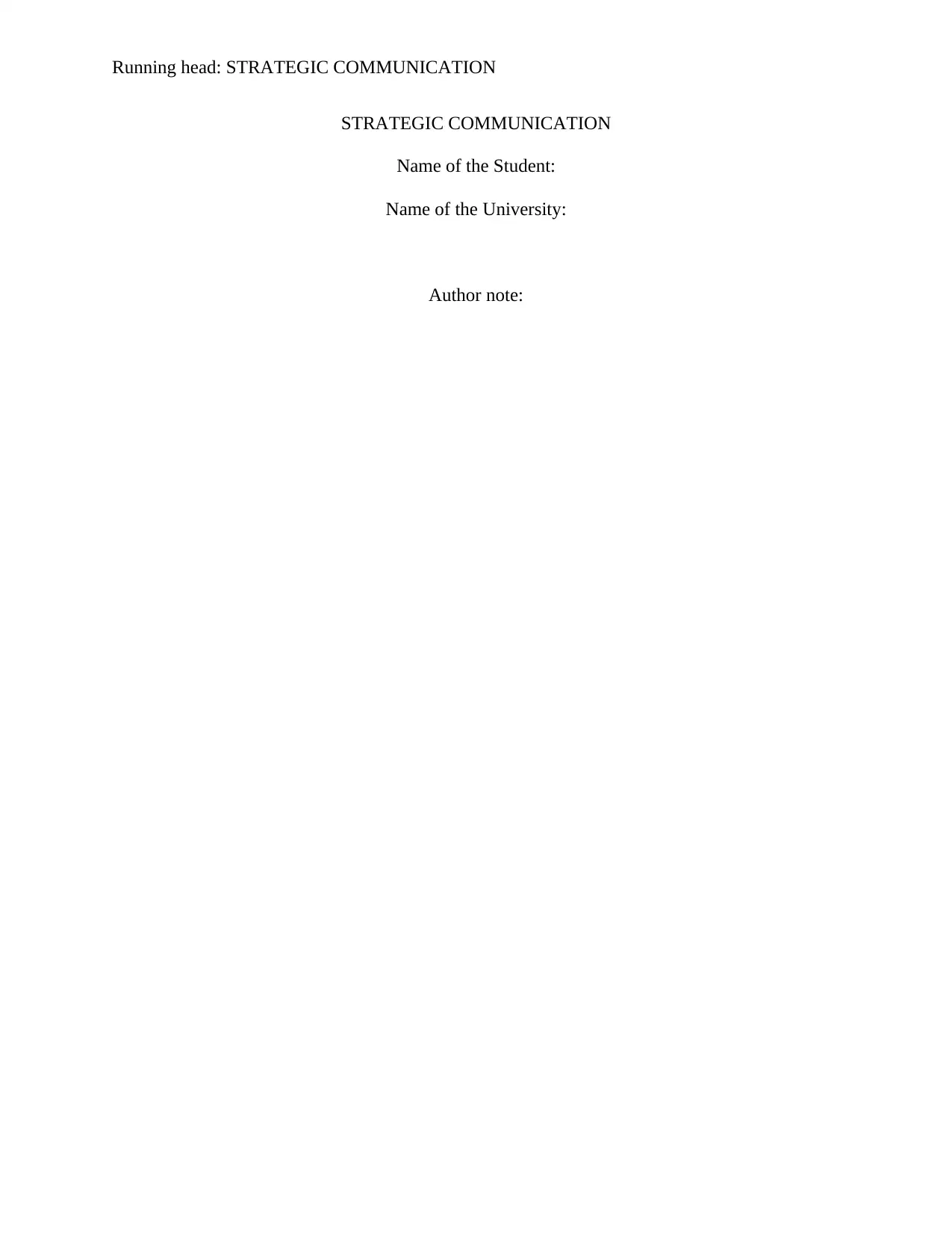
Running head: STRATEGIC COMMUNICATION
STRATEGIC COMMUNICATION
Name of the Student:
Name of the University:
Author note:
STRATEGIC COMMUNICATION
Name of the Student:
Name of the University:
Author note:
Paraphrase This Document
Need a fresh take? Get an instant paraphrase of this document with our AI Paraphraser
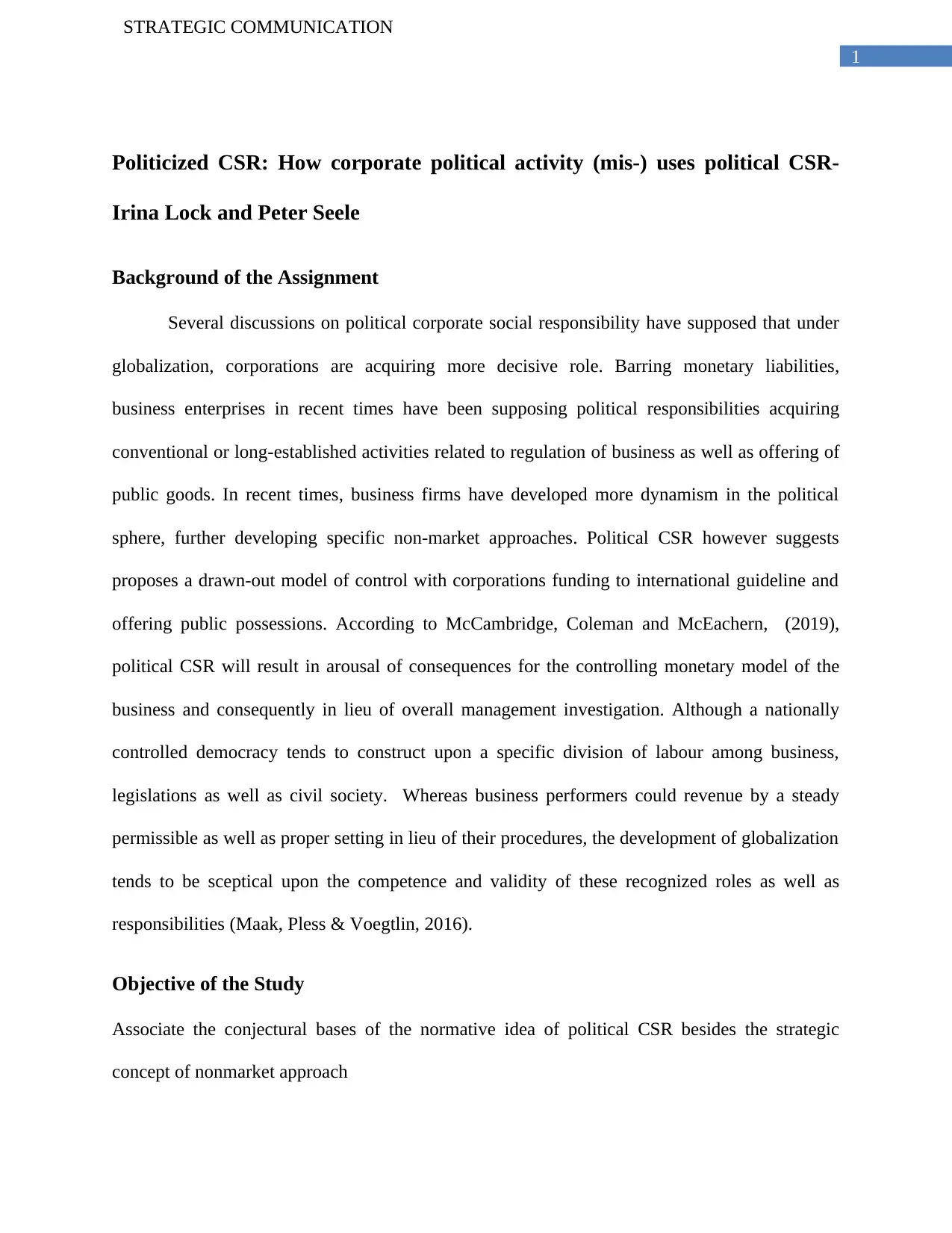
1
STRATEGIC COMMUNICATION
Politicized CSR: How corporate political activity (mis‐) uses political CSR-
Irina Lock and Peter Seele
Background of the Assignment
Several discussions on political corporate social responsibility have supposed that under
globalization, corporations are acquiring more decisive role. Barring monetary liabilities,
business enterprises in recent times have been supposing political responsibilities acquiring
conventional or long-established activities related to regulation of business as well as offering of
public goods. In recent times, business firms have developed more dynamism in the political
sphere, further developing specific non-market approaches. Political CSR however suggests
proposes a drawn-out model of control with corporations funding to international guideline and
offering public possessions. According to McCambridge, Coleman and McEachern, (2019),
political CSR will result in arousal of consequences for the controlling monetary model of the
business and consequently in lieu of overall management investigation. Although a nationally
controlled democracy tends to construct upon a specific division of labour among business,
legislations as well as civil society. Whereas business performers could revenue by a steady
permissible as well as proper setting in lieu of their procedures, the development of globalization
tends to be sceptical upon the competence and validity of these recognized roles as well as
responsibilities (Maak, Pless & Voegtlin, 2016).
Objective of the Study
Associate the conjectural bases of the normative idea of political CSR besides the strategic
concept of nonmarket approach
STRATEGIC COMMUNICATION
Politicized CSR: How corporate political activity (mis‐) uses political CSR-
Irina Lock and Peter Seele
Background of the Assignment
Several discussions on political corporate social responsibility have supposed that under
globalization, corporations are acquiring more decisive role. Barring monetary liabilities,
business enterprises in recent times have been supposing political responsibilities acquiring
conventional or long-established activities related to regulation of business as well as offering of
public goods. In recent times, business firms have developed more dynamism in the political
sphere, further developing specific non-market approaches. Political CSR however suggests
proposes a drawn-out model of control with corporations funding to international guideline and
offering public possessions. According to McCambridge, Coleman and McEachern, (2019),
political CSR will result in arousal of consequences for the controlling monetary model of the
business and consequently in lieu of overall management investigation. Although a nationally
controlled democracy tends to construct upon a specific division of labour among business,
legislations as well as civil society. Whereas business performers could revenue by a steady
permissible as well as proper setting in lieu of their procedures, the development of globalization
tends to be sceptical upon the competence and validity of these recognized roles as well as
responsibilities (Maak, Pless & Voegtlin, 2016).
Objective of the Study
Associate the conjectural bases of the normative idea of political CSR besides the strategic
concept of nonmarket approach
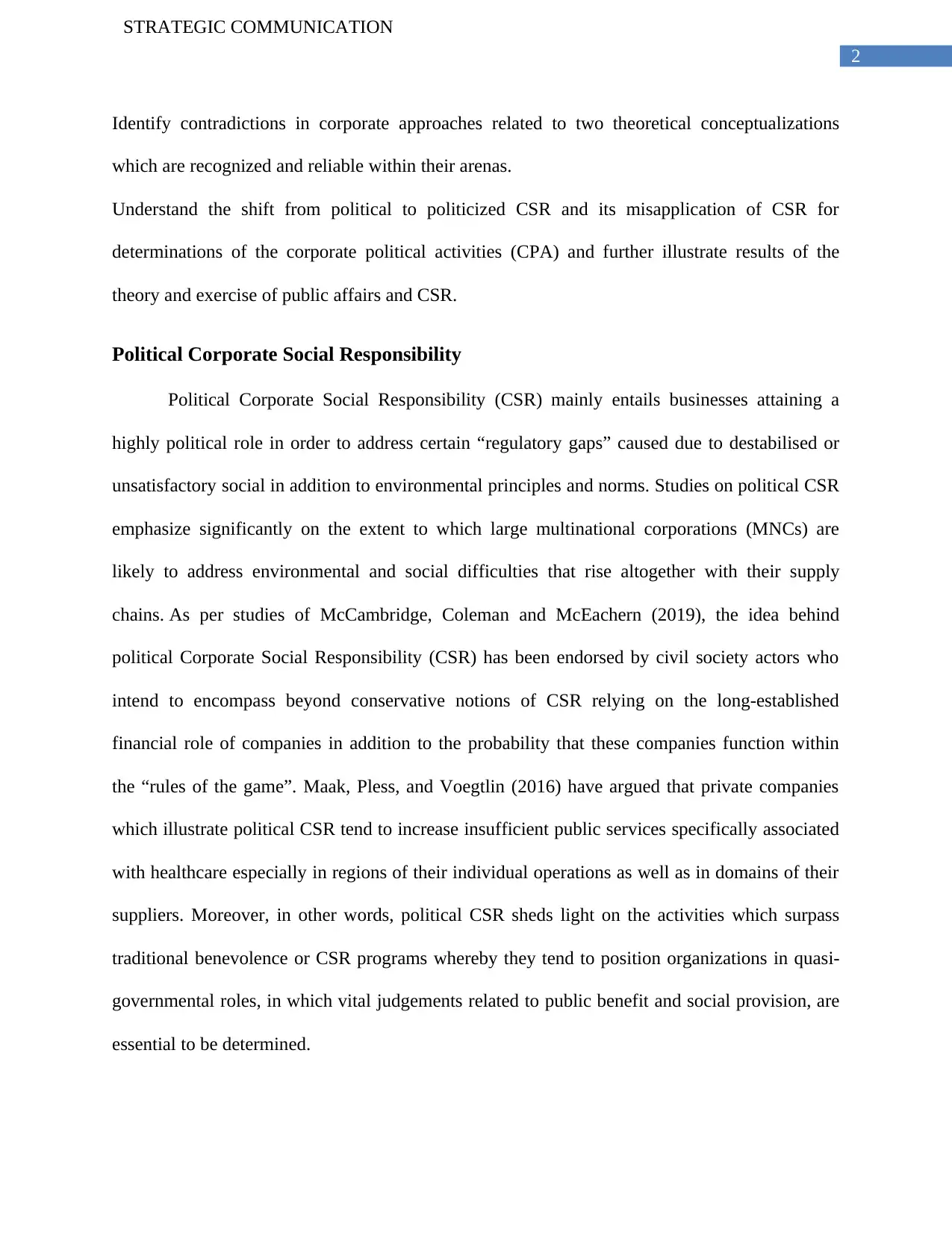
2
STRATEGIC COMMUNICATION
Identify contradictions in corporate approaches related to two theoretical conceptualizations
which are recognized and reliable within their arenas.
Understand the shift from political to politicized CSR and its misapplication of CSR for
determinations of the corporate political activities (CPA) and further illustrate results of the
theory and exercise of public affairs and CSR.
Political Corporate Social Responsibility
Political Corporate Social Responsibility (CSR) mainly entails businesses attaining a
highly political role in order to address certain “regulatory gaps” caused due to destabilised or
unsatisfactory social in addition to environmental principles and norms. Studies on political CSR
emphasize significantly on the extent to which large multinational corporations (MNCs) are
likely to address environmental and social difficulties that rise altogether with their supply
chains. As per studies of McCambridge, Coleman and McEachern (2019), the idea behind
political Corporate Social Responsibility (CSR) has been endorsed by civil society actors who
intend to encompass beyond conservative notions of CSR relying on the long-established
financial role of companies in addition to the probability that these companies function within
the “rules of the game”. Maak, Pless, and Voegtlin (2016) have argued that private companies
which illustrate political CSR tend to increase insufficient public services specifically associated
with healthcare especially in regions of their individual operations as well as in domains of their
suppliers. Moreover, in other words, political CSR sheds light on the activities which surpass
traditional benevolence or CSR programs whereby they tend to position organizations in quasi-
governmental roles, in which vital judgements related to public benefit and social provision, are
essential to be determined.
STRATEGIC COMMUNICATION
Identify contradictions in corporate approaches related to two theoretical conceptualizations
which are recognized and reliable within their arenas.
Understand the shift from political to politicized CSR and its misapplication of CSR for
determinations of the corporate political activities (CPA) and further illustrate results of the
theory and exercise of public affairs and CSR.
Political Corporate Social Responsibility
Political Corporate Social Responsibility (CSR) mainly entails businesses attaining a
highly political role in order to address certain “regulatory gaps” caused due to destabilised or
unsatisfactory social in addition to environmental principles and norms. Studies on political CSR
emphasize significantly on the extent to which large multinational corporations (MNCs) are
likely to address environmental and social difficulties that rise altogether with their supply
chains. As per studies of McCambridge, Coleman and McEachern (2019), the idea behind
political Corporate Social Responsibility (CSR) has been endorsed by civil society actors who
intend to encompass beyond conservative notions of CSR relying on the long-established
financial role of companies in addition to the probability that these companies function within
the “rules of the game”. Maak, Pless, and Voegtlin (2016) have argued that private companies
which illustrate political CSR tend to increase insufficient public services specifically associated
with healthcare especially in regions of their individual operations as well as in domains of their
suppliers. Moreover, in other words, political CSR sheds light on the activities which surpass
traditional benevolence or CSR programs whereby they tend to position organizations in quasi-
governmental roles, in which vital judgements related to public benefit and social provision, are
essential to be determined.
⊘ This is a preview!⊘
Do you want full access?
Subscribe today to unlock all pages.

Trusted by 1+ million students worldwide
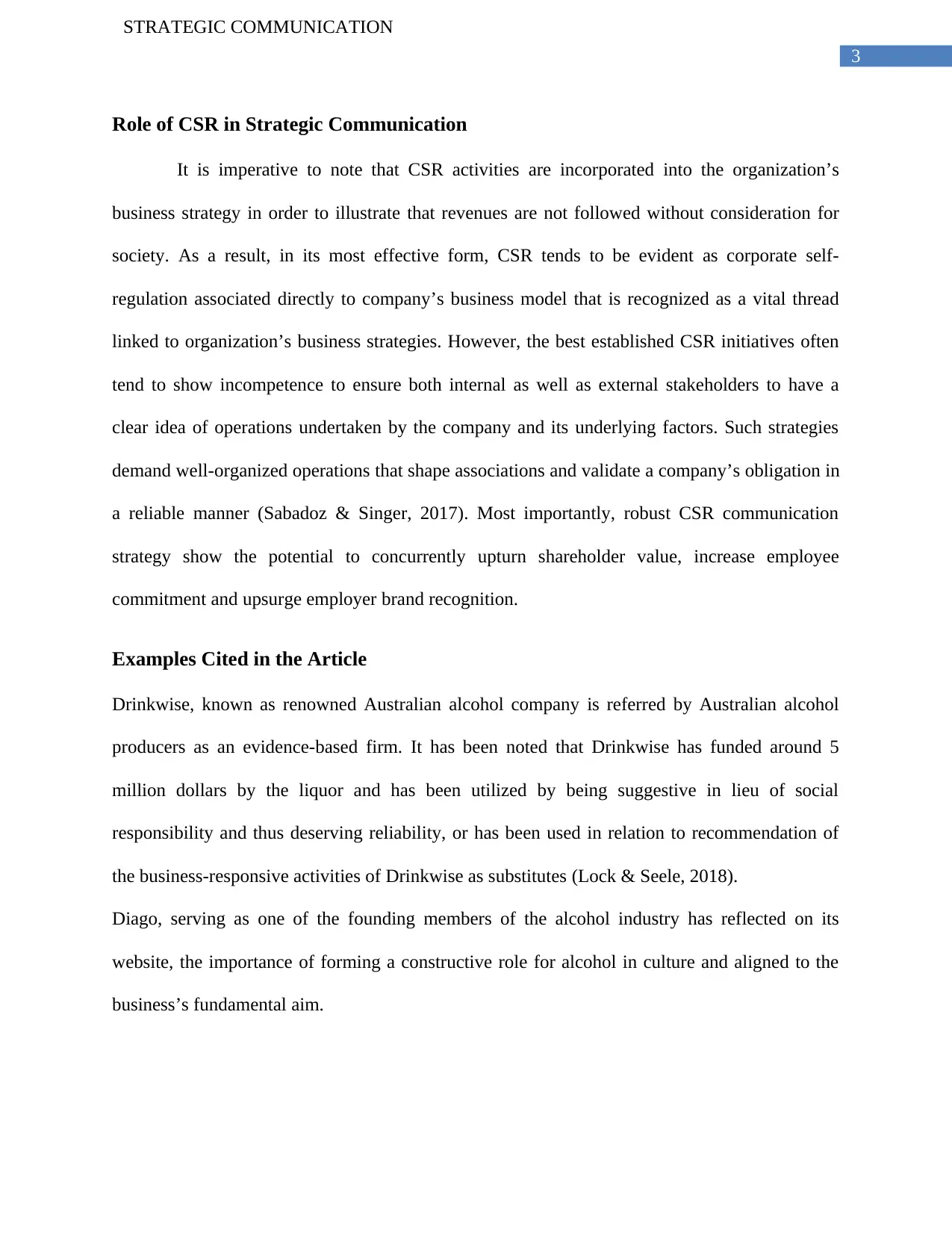
3
STRATEGIC COMMUNICATION
Role of CSR in Strategic Communication
It is imperative to note that CSR activities are incorporated into the organization’s
business strategy in order to illustrate that revenues are not followed without consideration for
society. As a result, in its most effective form, CSR tends to be evident as corporate self-
regulation associated directly to company’s business model that is recognized as a vital thread
linked to organization’s business strategies. However, the best established CSR initiatives often
tend to show incompetence to ensure both internal as well as external stakeholders to have a
clear idea of operations undertaken by the company and its underlying factors. Such strategies
demand well-organized operations that shape associations and validate a company’s obligation in
a reliable manner (Sabadoz & Singer, 2017). Most importantly, robust CSR communication
strategy show the potential to concurrently upturn shareholder value, increase employee
commitment and upsurge employer brand recognition.
Examples Cited in the Article
Drinkwise, known as renowned Australian alcohol company is referred by Australian alcohol
producers as an evidence-based firm. It has been noted that Drinkwise has funded around 5
million dollars by the liquor and has been utilized by being suggestive in lieu of social
responsibility and thus deserving reliability, or has been used in relation to recommendation of
the business‐responsive activities of Drinkwise as substitutes (Lock & Seele, 2018).
Diago, serving as one of the founding members of the alcohol industry has reflected on its
website, the importance of forming a constructive role for alcohol in culture and aligned to the
business’s fundamental aim.
STRATEGIC COMMUNICATION
Role of CSR in Strategic Communication
It is imperative to note that CSR activities are incorporated into the organization’s
business strategy in order to illustrate that revenues are not followed without consideration for
society. As a result, in its most effective form, CSR tends to be evident as corporate self-
regulation associated directly to company’s business model that is recognized as a vital thread
linked to organization’s business strategies. However, the best established CSR initiatives often
tend to show incompetence to ensure both internal as well as external stakeholders to have a
clear idea of operations undertaken by the company and its underlying factors. Such strategies
demand well-organized operations that shape associations and validate a company’s obligation in
a reliable manner (Sabadoz & Singer, 2017). Most importantly, robust CSR communication
strategy show the potential to concurrently upturn shareholder value, increase employee
commitment and upsurge employer brand recognition.
Examples Cited in the Article
Drinkwise, known as renowned Australian alcohol company is referred by Australian alcohol
producers as an evidence-based firm. It has been noted that Drinkwise has funded around 5
million dollars by the liquor and has been utilized by being suggestive in lieu of social
responsibility and thus deserving reliability, or has been used in relation to recommendation of
the business‐responsive activities of Drinkwise as substitutes (Lock & Seele, 2018).
Diago, serving as one of the founding members of the alcohol industry has reflected on its
website, the importance of forming a constructive role for alcohol in culture and aligned to the
business’s fundamental aim.
Paraphrase This Document
Need a fresh take? Get an instant paraphrase of this document with our AI Paraphraser
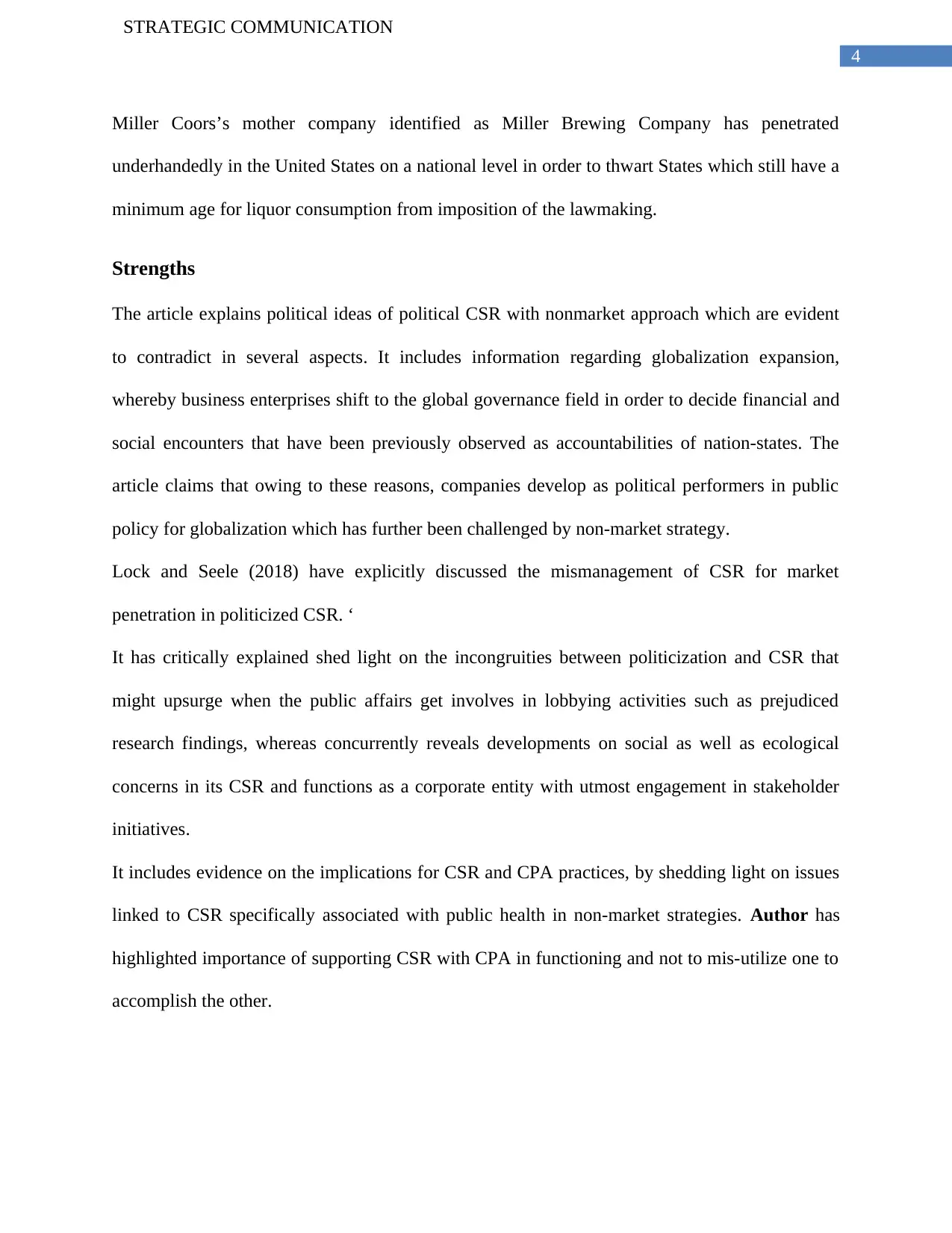
4
STRATEGIC COMMUNICATION
Miller Coors’s mother company identified as Miller Brewing Company has penetrated
underhandedly in the United States on a national level in order to thwart States which still have a
minimum age for liquor consumption from imposition of the lawmaking.
Strengths
The article explains political ideas of political CSR with nonmarket approach which are evident
to contradict in several aspects. It includes information regarding globalization expansion,
whereby business enterprises shift to the global governance field in order to decide financial and
social encounters that have been previously observed as accountabilities of nation‐states. The
article claims that owing to these reasons, companies develop as political performers in public
policy for globalization which has further been challenged by non-market strategy.
Lock and Seele (2018) have explicitly discussed the mismanagement of CSR for market
penetration in politicized CSR. ‘
It has critically explained shed light on the incongruities between politicization and CSR that
might upsurge when the public affairs get involves in lobbying activities such as prejudiced
research findings, whereas concurrently reveals developments on social as well as ecological
concerns in its CSR and functions as a corporate entity with utmost engagement in stakeholder
initiatives.
It includes evidence on the implications for CSR and CPA practices, by shedding light on issues
linked to CSR specifically associated with public health in non-market strategies. Author has
highlighted importance of supporting CSR with CPA in functioning and not to mis-utilize one to
accomplish the other.
STRATEGIC COMMUNICATION
Miller Coors’s mother company identified as Miller Brewing Company has penetrated
underhandedly in the United States on a national level in order to thwart States which still have a
minimum age for liquor consumption from imposition of the lawmaking.
Strengths
The article explains political ideas of political CSR with nonmarket approach which are evident
to contradict in several aspects. It includes information regarding globalization expansion,
whereby business enterprises shift to the global governance field in order to decide financial and
social encounters that have been previously observed as accountabilities of nation‐states. The
article claims that owing to these reasons, companies develop as political performers in public
policy for globalization which has further been challenged by non-market strategy.
Lock and Seele (2018) have explicitly discussed the mismanagement of CSR for market
penetration in politicized CSR. ‘
It has critically explained shed light on the incongruities between politicization and CSR that
might upsurge when the public affairs get involves in lobbying activities such as prejudiced
research findings, whereas concurrently reveals developments on social as well as ecological
concerns in its CSR and functions as a corporate entity with utmost engagement in stakeholder
initiatives.
It includes evidence on the implications for CSR and CPA practices, by shedding light on issues
linked to CSR specifically associated with public health in non-market strategies. Author has
highlighted importance of supporting CSR with CPA in functioning and not to mis-utilize one to
accomplish the other.
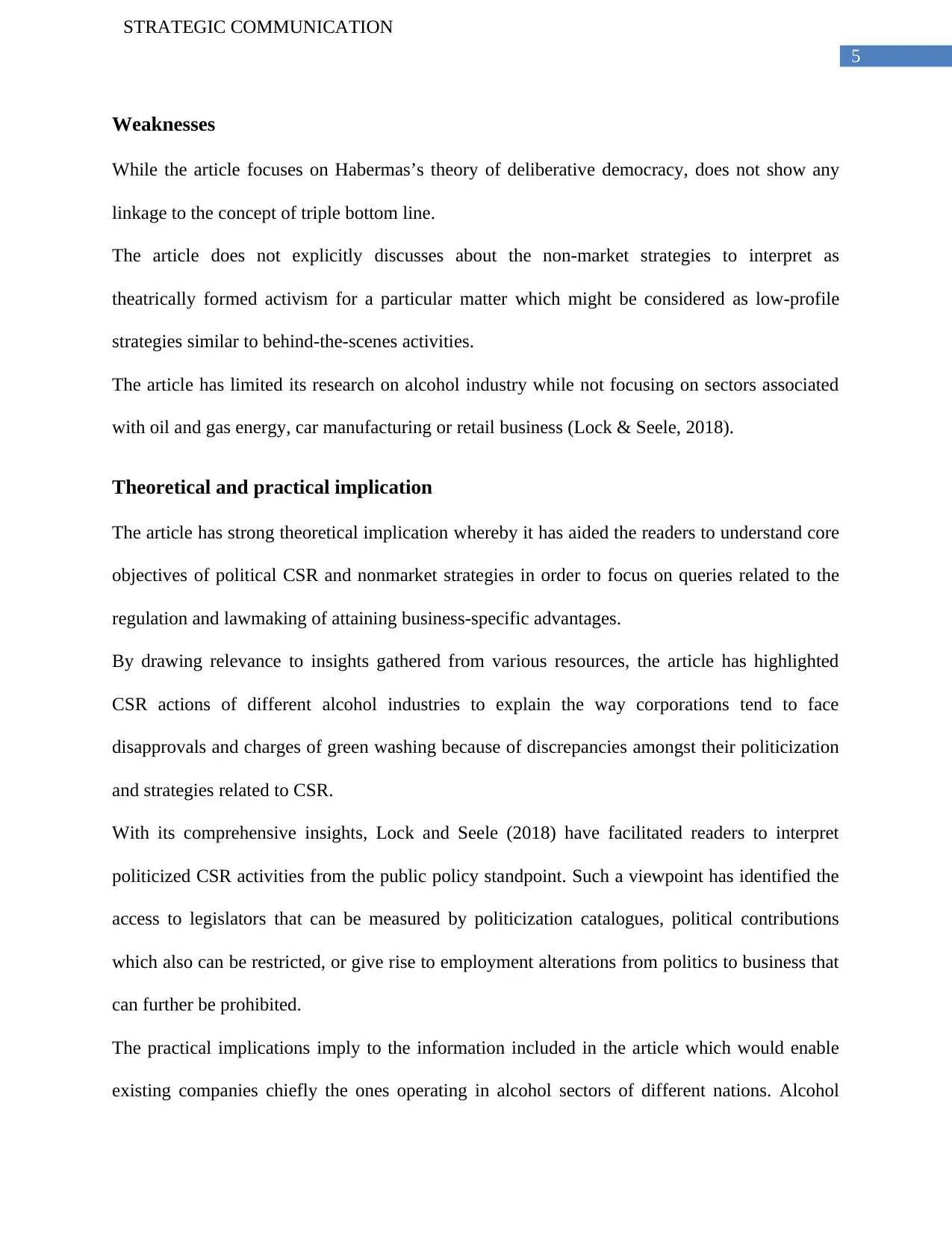
5
STRATEGIC COMMUNICATION
Weaknesses
While the article focuses on Habermas’s theory of deliberative democracy, does not show any
linkage to the concept of triple bottom line.
The article does not explicitly discusses about the non-market strategies to interpret as
theatrically formed activism for a particular matter which might be considered as low‐profile
strategies similar to behind‐the‐scenes activities.
The article has limited its research on alcohol industry while not focusing on sectors associated
with oil and gas energy, car manufacturing or retail business (Lock & Seele, 2018).
Theoretical and practical implication
The article has strong theoretical implication whereby it has aided the readers to understand core
objectives of political CSR and nonmarket strategies in order to focus on queries related to the
regulation and lawmaking of attaining business-specific advantages.
By drawing relevance to insights gathered from various resources, the article has highlighted
CSR actions of different alcohol industries to explain the way corporations tend to face
disapprovals and charges of green washing because of discrepancies amongst their politicization
and strategies related to CSR.
With its comprehensive insights, Lock and Seele (2018) have facilitated readers to interpret
politicized CSR activities from the public policy standpoint. Such a viewpoint has identified the
access to legislators that can be measured by politicization catalogues, political contributions
which also can be restricted, or give rise to employment alterations from politics to business that
can further be prohibited.
The practical implications imply to the information included in the article which would enable
existing companies chiefly the ones operating in alcohol sectors of different nations. Alcohol
STRATEGIC COMMUNICATION
Weaknesses
While the article focuses on Habermas’s theory of deliberative democracy, does not show any
linkage to the concept of triple bottom line.
The article does not explicitly discusses about the non-market strategies to interpret as
theatrically formed activism for a particular matter which might be considered as low‐profile
strategies similar to behind‐the‐scenes activities.
The article has limited its research on alcohol industry while not focusing on sectors associated
with oil and gas energy, car manufacturing or retail business (Lock & Seele, 2018).
Theoretical and practical implication
The article has strong theoretical implication whereby it has aided the readers to understand core
objectives of political CSR and nonmarket strategies in order to focus on queries related to the
regulation and lawmaking of attaining business-specific advantages.
By drawing relevance to insights gathered from various resources, the article has highlighted
CSR actions of different alcohol industries to explain the way corporations tend to face
disapprovals and charges of green washing because of discrepancies amongst their politicization
and strategies related to CSR.
With its comprehensive insights, Lock and Seele (2018) have facilitated readers to interpret
politicized CSR activities from the public policy standpoint. Such a viewpoint has identified the
access to legislators that can be measured by politicization catalogues, political contributions
which also can be restricted, or give rise to employment alterations from politics to business that
can further be prohibited.
The practical implications imply to the information included in the article which would enable
existing companies chiefly the ones operating in alcohol sectors of different nations. Alcohol
⊘ This is a preview!⊘
Do you want full access?
Subscribe today to unlock all pages.

Trusted by 1+ million students worldwide
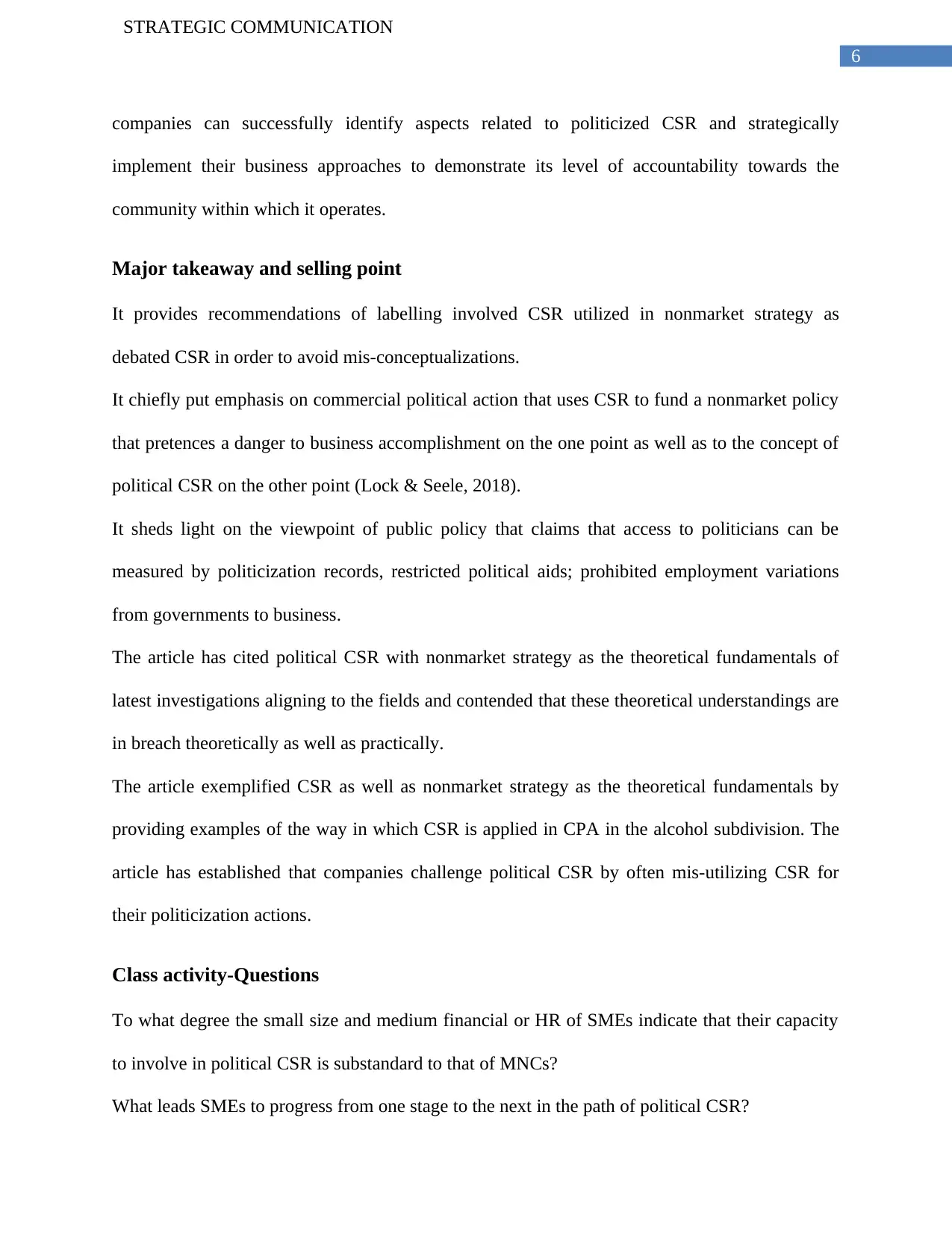
6
STRATEGIC COMMUNICATION
companies can successfully identify aspects related to politicized CSR and strategically
implement their business approaches to demonstrate its level of accountability towards the
community within which it operates.
Major takeaway and selling point
It provides recommendations of labelling involved CSR utilized in nonmarket strategy as
debated CSR in order to avoid mis-conceptualizations.
It chiefly put emphasis on commercial political action that uses CSR to fund a nonmarket policy
that pretences a danger to business accomplishment on the one point as well as to the concept of
political CSR on the other point (Lock & Seele, 2018).
It sheds light on the viewpoint of public policy that claims that access to politicians can be
measured by politicization records, restricted political aids; prohibited employment variations
from governments to business.
The article has cited political CSR with nonmarket strategy as the theoretical fundamentals of
latest investigations aligning to the fields and contended that these theoretical understandings are
in breach theoretically as well as practically.
The article exemplified CSR as well as nonmarket strategy as the theoretical fundamentals by
providing examples of the way in which CSR is applied in CPA in the alcohol subdivision. The
article has established that companies challenge political CSR by often mis-utilizing CSR for
their politicization actions.
Class activity-Questions
To what degree the small size and medium financial or HR of SMEs indicate that their capacity
to involve in political CSR is substandard to that of MNCs?
What leads SMEs to progress from one stage to the next in the path of political CSR?
STRATEGIC COMMUNICATION
companies can successfully identify aspects related to politicized CSR and strategically
implement their business approaches to demonstrate its level of accountability towards the
community within which it operates.
Major takeaway and selling point
It provides recommendations of labelling involved CSR utilized in nonmarket strategy as
debated CSR in order to avoid mis-conceptualizations.
It chiefly put emphasis on commercial political action that uses CSR to fund a nonmarket policy
that pretences a danger to business accomplishment on the one point as well as to the concept of
political CSR on the other point (Lock & Seele, 2018).
It sheds light on the viewpoint of public policy that claims that access to politicians can be
measured by politicization records, restricted political aids; prohibited employment variations
from governments to business.
The article has cited political CSR with nonmarket strategy as the theoretical fundamentals of
latest investigations aligning to the fields and contended that these theoretical understandings are
in breach theoretically as well as practically.
The article exemplified CSR as well as nonmarket strategy as the theoretical fundamentals by
providing examples of the way in which CSR is applied in CPA in the alcohol subdivision. The
article has established that companies challenge political CSR by often mis-utilizing CSR for
their politicization actions.
Class activity-Questions
To what degree the small size and medium financial or HR of SMEs indicate that their capacity
to involve in political CSR is substandard to that of MNCs?
What leads SMEs to progress from one stage to the next in the path of political CSR?
Paraphrase This Document
Need a fresh take? Get an instant paraphrase of this document with our AI Paraphraser
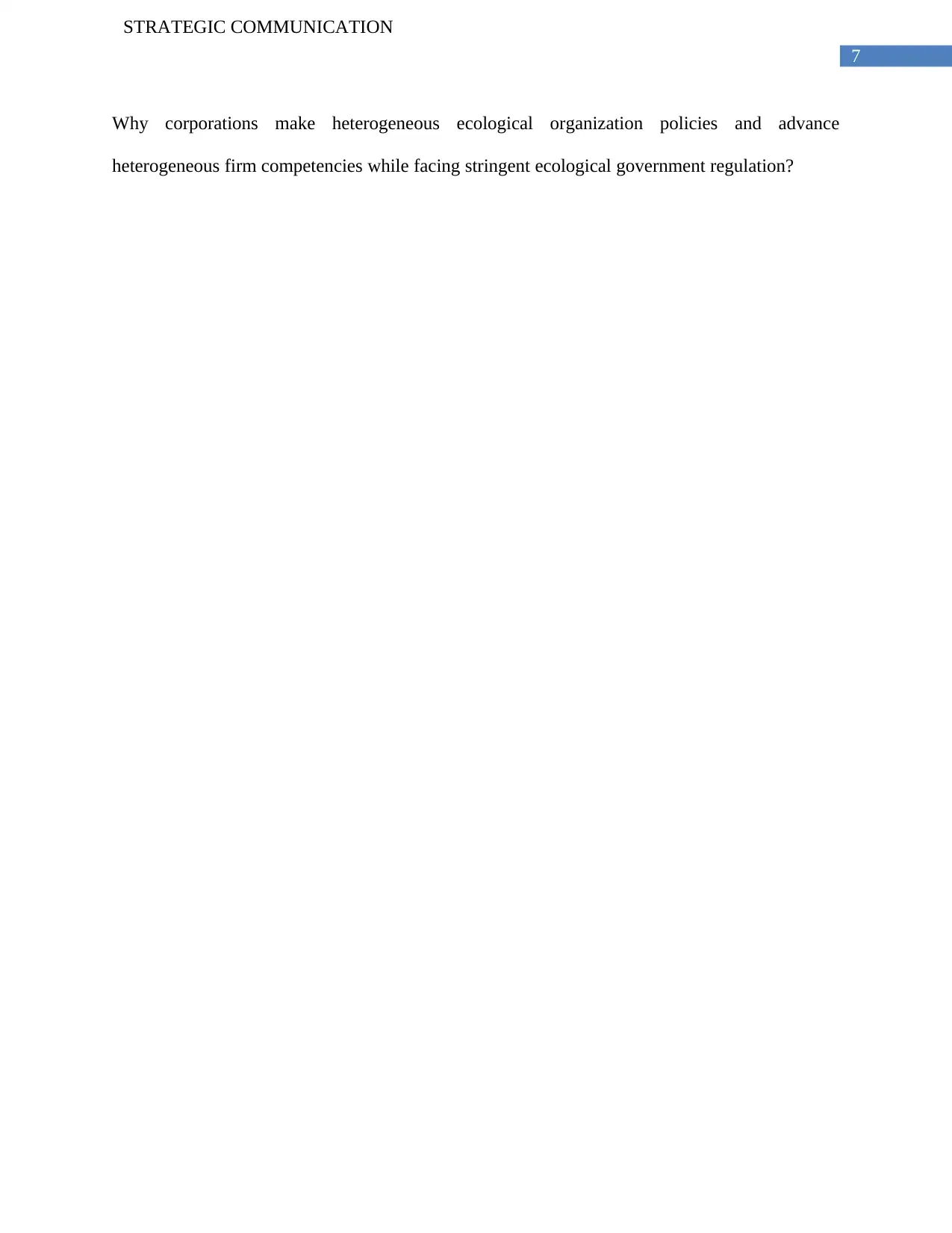
7
STRATEGIC COMMUNICATION
Why corporations make heterogeneous ecological organization policies and advance
heterogeneous firm competencies while facing stringent ecological government regulation?
STRATEGIC COMMUNICATION
Why corporations make heterogeneous ecological organization policies and advance
heterogeneous firm competencies while facing stringent ecological government regulation?
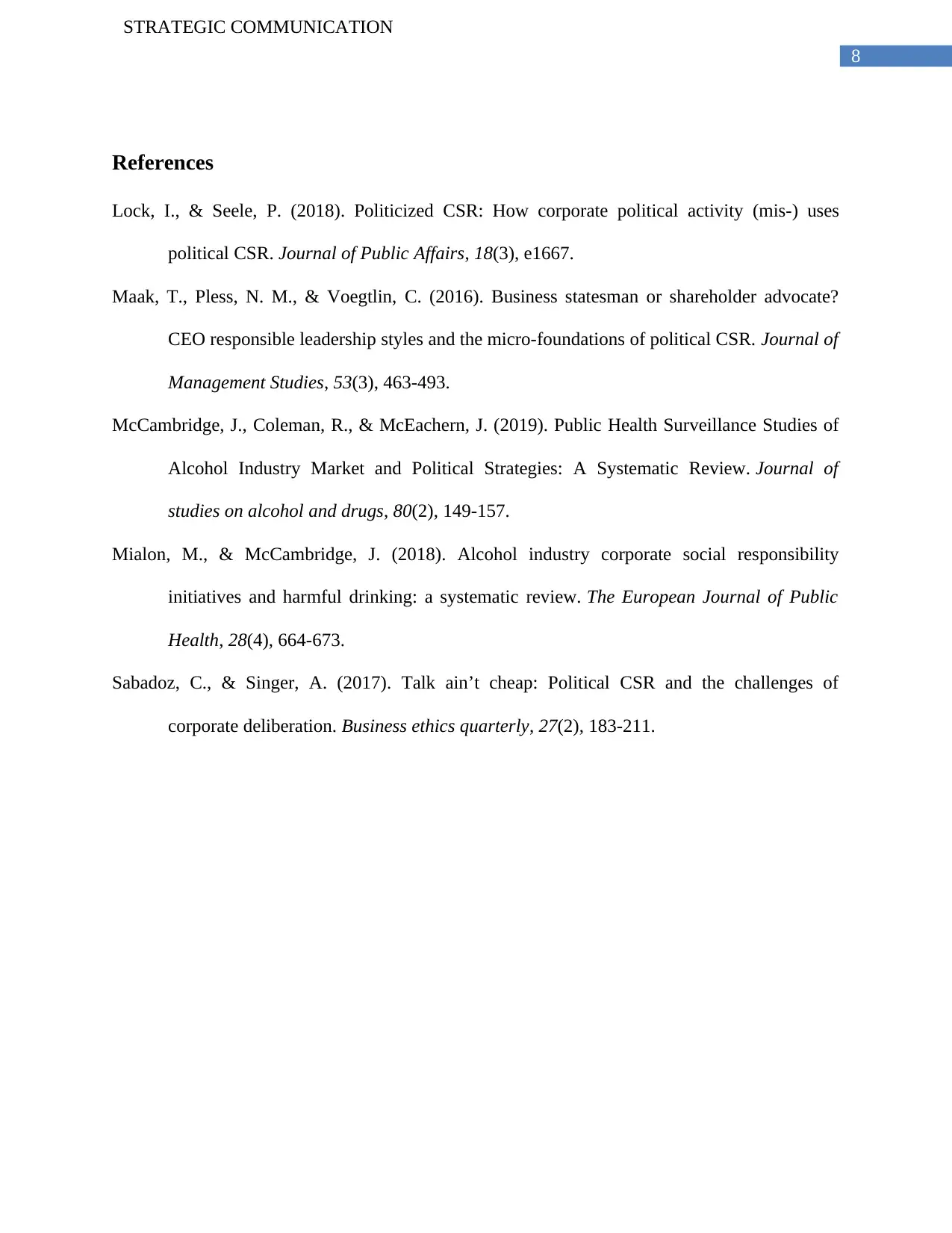
8
STRATEGIC COMMUNICATION
References
Lock, I., & Seele, P. (2018). Politicized CSR: How corporate political activity (mis‐) uses
political CSR. Journal of Public Affairs, 18(3), e1667.
Maak, T., Pless, N. M., & Voegtlin, C. (2016). Business statesman or shareholder advocate?
CEO responsible leadership styles and the micro‐foundations of political CSR. Journal of
Management Studies, 53(3), 463-493.
McCambridge, J., Coleman, R., & McEachern, J. (2019). Public Health Surveillance Studies of
Alcohol Industry Market and Political Strategies: A Systematic Review. Journal of
studies on alcohol and drugs, 80(2), 149-157.
Mialon, M., & McCambridge, J. (2018). Alcohol industry corporate social responsibility
initiatives and harmful drinking: a systematic review. The European Journal of Public
Health, 28(4), 664-673.
Sabadoz, C., & Singer, A. (2017). Talk ain’t cheap: Political CSR and the challenges of
corporate deliberation. Business ethics quarterly, 27(2), 183-211.
STRATEGIC COMMUNICATION
References
Lock, I., & Seele, P. (2018). Politicized CSR: How corporate political activity (mis‐) uses
political CSR. Journal of Public Affairs, 18(3), e1667.
Maak, T., Pless, N. M., & Voegtlin, C. (2016). Business statesman or shareholder advocate?
CEO responsible leadership styles and the micro‐foundations of political CSR. Journal of
Management Studies, 53(3), 463-493.
McCambridge, J., Coleman, R., & McEachern, J. (2019). Public Health Surveillance Studies of
Alcohol Industry Market and Political Strategies: A Systematic Review. Journal of
studies on alcohol and drugs, 80(2), 149-157.
Mialon, M., & McCambridge, J. (2018). Alcohol industry corporate social responsibility
initiatives and harmful drinking: a systematic review. The European Journal of Public
Health, 28(4), 664-673.
Sabadoz, C., & Singer, A. (2017). Talk ain’t cheap: Political CSR and the challenges of
corporate deliberation. Business ethics quarterly, 27(2), 183-211.
⊘ This is a preview!⊘
Do you want full access?
Subscribe today to unlock all pages.

Trusted by 1+ million students worldwide
1 out of 9
Your All-in-One AI-Powered Toolkit for Academic Success.
+13062052269
info@desklib.com
Available 24*7 on WhatsApp / Email
![[object Object]](/_next/static/media/star-bottom.7253800d.svg)
Unlock your academic potential
Copyright © 2020–2026 A2Z Services. All Rights Reserved. Developed and managed by ZUCOL.